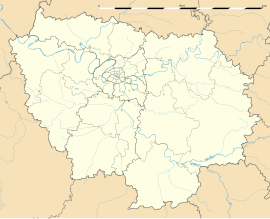Le Vésinet
Le Vésinet | |
|---|---|
 Le Vésinet Town Hall | |
 Location (in red) within Paris inner and outer suburbs | |
| Coordinates: 48°53′32″N 2°07′59″E / 48.8923°N 2.1331°E | |
| Country | France |
| Region | Île-de-France |
| Department | Yvelines |
| Arrondissement | Saint-Germain-en-Laye |
| Canton | Chatou |
| Intercommunality | CA Saint Germain Boucles Seine |
| Government | |
| • Mayor (2020–2026) | Bruno Coradetti[1] |
| Area 1 | 5.0 km2 (1.9 sq mi) |
| Population (2021)[2] | 15,646 |
| • Density | 3,100/km2 (8,100/sq mi) |
| Time zone | UTC+01:00 (CET) |
| • Summer (DST) | UTC+02:00 (CEST) |
| INSEE/Postal code | 78650 /78110 |
| Elevation | 26–47 m (85–154 ft) |
| 1 French Land Register data, which excludes lakes, ponds, glaciers > 1 km2 (0.386 sq mi or 247 acres) and river estuaries. | |
Le Vésinet (French: [lə vezinɛ] ) is a suburban commune in the Yvelines department in the Île-de-France region in north-central France. It is a part of the affluent outer suburbs of western Paris, 16.4 km (10.2 mi) from the centre of Paris.
Le Vésinet is one of the wealthiest suburbs of Paris, known for its wooded avenues, mansions and lakes. It contains many public gardens designed by French landscape gardener Paul de Lavenne, comte de Choulot.
History
[edit]The commune of Le Vésinet was created on 31 May 1875 by detaching a part of the territory of Chatou and merging it with a part of the territory of Croissy-sur-Seine and a part of the territory of Le Pecq.
In 1925 and from 1927 to 1939, the Tour de France began in Le Vésinet.
Geography
[edit]Le Vésinet is located in a bend of the Seine, but has no access to the river. It is 16.4 km (10.2 mi) west of Paris and 4 km east of Saint-Germain-en-Laye. The surrounding communes are Chatou on the east, Croissy-sur-Seine on the south, Le Pecq on the west, and Montesson on the north.
The terrain is an alluvial plain ranging in altitude from 28 meters near Le Pecq to 45 meters at the end of the Route de Montesson, with a gentle slope from northeast to southwest.
The commune is entirely urbanized, principally with single-family dwellings. Green space comprises 20 percent of the territory. There are a number of lakes: the lac Supérieur, the lac Inférieur, the lac de la Station, the lac de Croissy, and the Grand lac (with a large central island, l'Île des Ibis) also called Lac des Ibis. These lakes are linked by nearly 4 km of artificial streams called les Petites Rivières.
Population
[edit]
|
| ||||||||||||||||||||||||||||||||||||||||||||||||||||||||||||||||||||||||||||||
| |||||||||||||||||||||||||||||||||||||||||||||||||||||||||||||||||||||||||||||||
| Source: EHESS[3] and INSEE (1968–2020)[4] | |||||||||||||||||||||||||||||||||||||||||||||||||||||||||||||||||||||||||||||||





Sights
[edit]Le Vésinet was the first "ville-parc" to be built in France.[5] It has many green spaces, lakes, and lavish mansions.
The following are notable buildings:
- L'hôpital du Vésinet (72 avenue de la Princesse), built by Eugène Laval in 1859
- Sainte-Marguerite (place de l'Eglise), built by Louis-Auguste Boileau from 1862 to 1865, the first non-industrial building in France built of concrete
- Villa Berthe ou La Hublotière (72 route de Montesson), built by Hector Guimard in 1896.
- Pink Palace (12 rue Diderot), built on the model of the Grand Trianon in Versailles by Arthur Schweitzer about 1900
- Wood Cottage (122 boulevard des Etats-Unis), classified as a historic monument in 2000. Built in 1864 by Tricotel, a landscaping firm.
- Villa Olivia (12 avenue Rembrandt) built by Pierre-Joseph Olive
- Sainte-Pauline, built in 1905
Since 1997, Le Vésinet has received the ultimate distinction of four flowers in the national competition for villes fleuries.
Transport
[edit]Le Vésinet is served by two stations on Paris RER line A: Le Vésinet – Centre and Le Vésinet – Le Pecq.
Education
[edit]The following public schools are in Le Vésinet:[6]
Preschools:
- Ecole maternelle Centre
- Ecole maternelle Charmettes
- Ecole maternelle La Borde
- Ecole maternelle Princesse
- Ecole maternelle Les Cygnes
Elementary schools:
- Ecole élémentaire Merlettes
- Ecole élémentaire Pallu
- Ecole élémentaire Pasteur
- Ecole élémentaire Princesse
Secondary schools:
- Collège du Cèdre (junior high school)
- Lycée Alain (senior high school/sixth form college)
Private schools:[7]
- Bon-Sauveur (preschool through senior high school)
- Sainte-Jeanne-d’Arc (preschool and elementary school)
- Sainte-Odile (preschool and elementary school)
- Ecole Saint-Charles (elementary school)
International school:
- Malherbe International School (nursery through middle school) [8]
Le Vésinet is served by the Bibliothèque intercommunale du Vésinet, a library.[9]
Twin towns – sister cities
[edit]Le Vésinet is twinned with:[10]
 Oakwood, United States
Oakwood, United States Outremont (Montreal), Canada
Outremont (Montreal), Canada Unterhaching, Germany
Unterhaching, Germany Villanueva de la Cañada, Spain
Villanueva de la Cañada, Spain Worcester, England, United Kingdom
Worcester, England, United Kingdom
Le Vésinet also has friendly relations with Hunters Hill in Australia.[10]
See also
[edit]References
[edit]- ^ "Répertoire national des élus: les maires" (in French). data.gouv.fr, Plateforme ouverte des données publiques françaises. 13 September 2022.
- ^ "Populations légales 2021" (in French). The National Institute of Statistics and Economic Studies. 28 December 2023.
- ^ Des villages de Cassini aux communes d'aujourd'hui: Commune data sheet Le Vésinet, EHESS (in French).
- ^ Population en historique depuis 1968, INSEE
- ^ Ville du Vésinet
- ^ "Etablissements scolaires publics." Le Vésinet. Retrieved on September 2, 2016.
- ^ "Etablissements privés." Le Vésinet. Retrieved on September 2, 2016.
- ^ "Malherbe International School" Le Vésinet, retrieved on December 27, 2020.
- ^ "Bibliothèque intercommunale du Vésinet." Le Vésinet. Retrieved on September 2, 2016.
- ^ a b "Nos villes jumelles". levesinet.fr (in French). Le Vésinet. Retrieved 2021-04-13.
External links
[edit]- Official website (in French)





